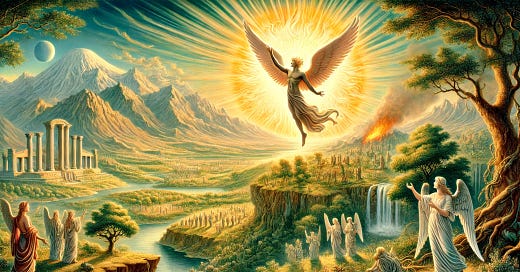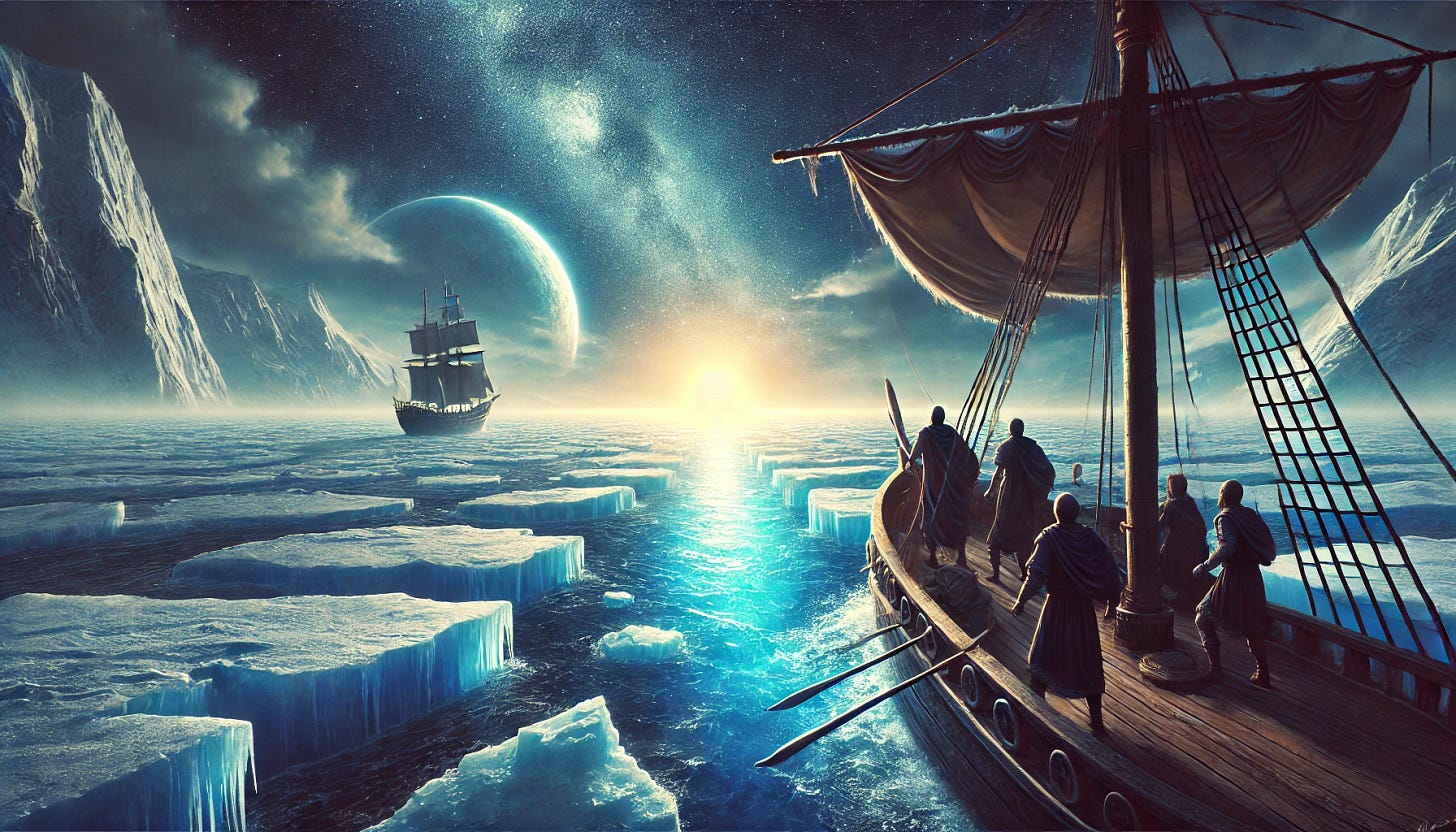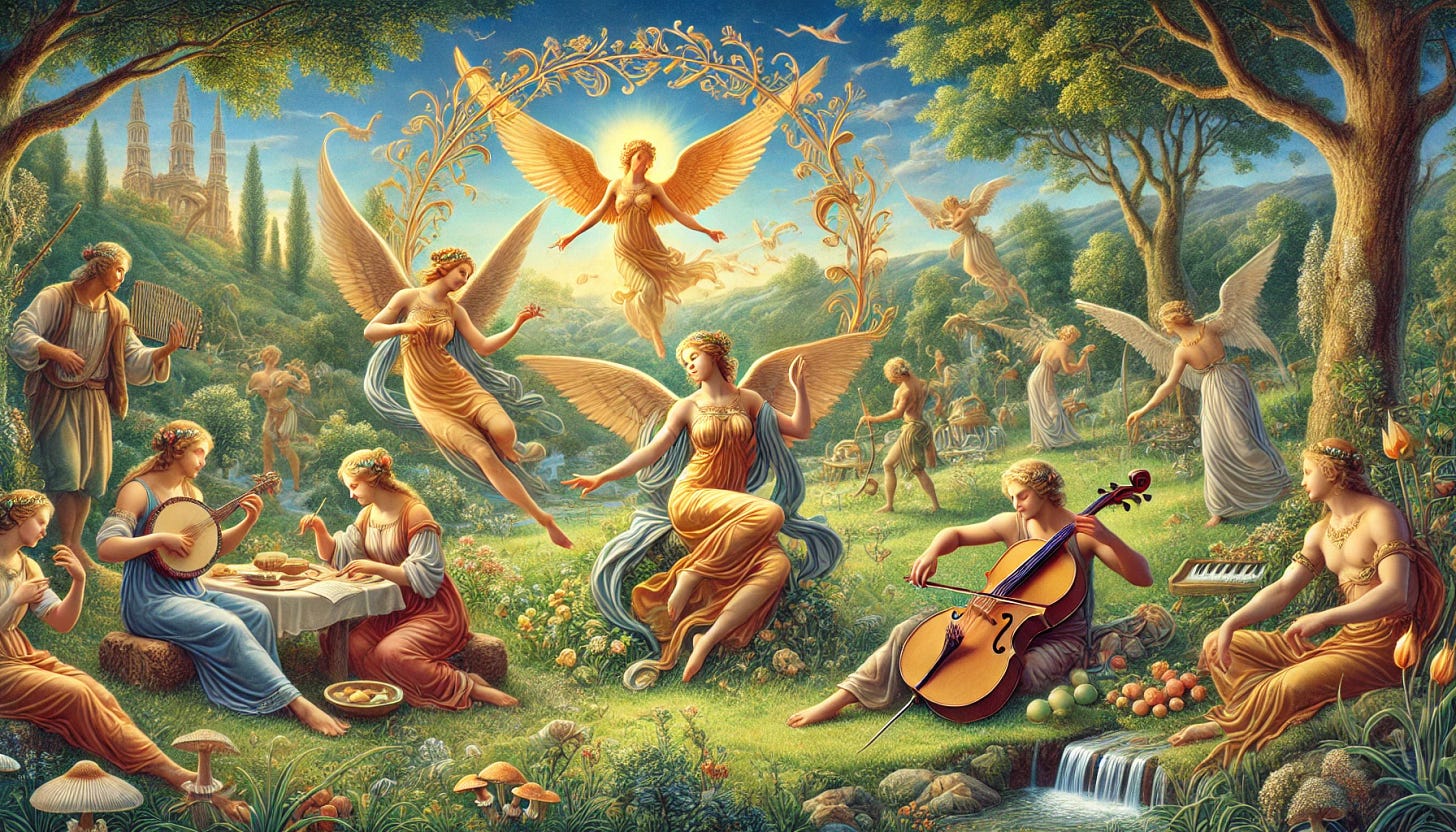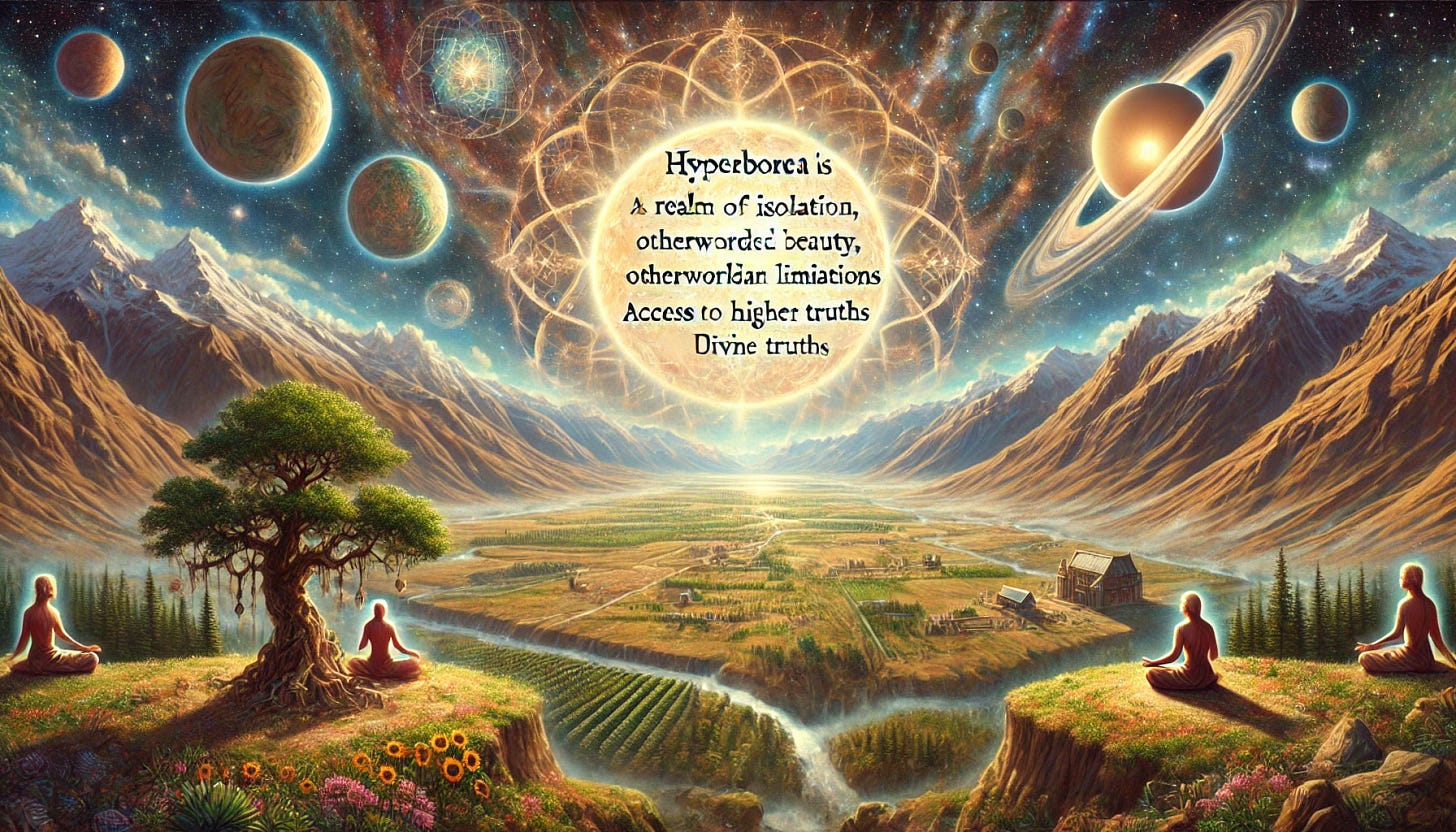Hyperborea: The Land Beyond the North Wind
Series 3: Mythical Lands and Celestial Mysteries // Episode 3
In the ancient myths of Greece, Hyperborea stood as a fabled paradise — a mysterious realm beyond Boreas, the North Wind, who was the god of the cold northern winds, often depicted as a powerful, winged figure. In this idyllic land, sunlight never ceased, the air remained warm, and its people lived lives of unbroken happiness and extreme longevity.
A place of perfection, Hyperborea captivated the imagination of philosophers, poets, and explorers alike, sparking a sense of wonder about what lay beyond the edges of the known world.
The term Hyperborea literally means beyond the North Wind, evoking an image of a distant paradise untouched by the sorrows and hardships of ordinary human existence.
But where exactly was this enigmatic land?
Was it merely a metaphor, or did it symbolise something more — a forgotten utopia, a spiritual state of existence, or even an unknown region lost to time?
Join us as we venture into the mysteries of Hyperborea, uncovering the myths, cultural significance, and the theories that surround this fascinating place beyond the North Wind.
The Myth and Mystique of Hyperborea
The ancient Greeks described Hyperborea as a land so far north that it lay beyond the icy winds of Boreas, the god of the North Wind.
In this mythical land:
Sunlight Never Ceased
Hyperborea was a region bathed in perpetual sunlight.Inhabitants Lived in Perfect Harmony
The Hyperboreans enjoyed long lives without disease or old age.Nature Flourished
It was filled with lush groves, abundant harvests, and sacred rivers.
A Land Blessed by Apollo
Hyperborea was said to be dedicated to Apollo, the Greek god of light, music, and healing. Apollo’s association with Hyperborea symbolised its status as a land of enlightenment and divine blessing, a place where the boundaries between the human and the divine blurred. Myths suggest that Apollo himself journeyed to Hyperborea for part of the year, spending his winters there among the enlightened Hyperboreans.
Connection to Apollo
This association reinforced the idea of Hyperborea as a place of enlightenment and divinity.Devotion and Festivals
The Hyperboreans were thought to be deeply devoted to Apollo, celebrating him with festivals, music, and offerings.
They lived in an unbroken state of tranquility, away from the conflicts and tribulations of the mortal world — representing an ideal that many ancient cultures longed for — a golden age of existence where suffering was unknown.
The Search for Hyperborea
While Hyperborea began as a mythic concept, it soon became an intriguing possibility for ancient geographers and explorers.
Classical Authors and Their Theories
Herodotus
He claimed that the Hyperboreans were a real people who sent gifts to the temple of Apollo at Delos.Pindar
He wrote of Hyperborea with reverence, describing it as a land at the edge of the world.
Possible Locations of Hyperborea
Some believed Hyperborea lay beyond the Rhipaean Mountains — a mythical range often considered the northern boundary of the known world — somewhere deep in the northern realms of Europe or Siberia. Others equated it with regions as diverse as Greenland, Iceland, or even the Arctic Circle.
The quest to locate Hyperborea captivated many explorers who yearned to find a place where the impossible became real — a land beyond the reach of time, war, and decay.
A Metaphor for the Human Condition?
Perhaps Hyperborea was never meant to be found. Instead, it might have served as a metaphor for an unattainable ideal — a symbol of human longing for a return to a simpler, purer existence.
Comparisons to Other Mythical Paradises
Hyperborea is reminiscent of other mythological paradises — Avalon, Lemuria, or Shambhala. Each of these places speaks to a universal human desire to transcend the limitations of the material world and find:
Harmony
Freedom from conflict.Peace
Escape from the burdens of mortality.Truth
A connection to a higher spiritual existence.
By locating Hyperborea at the farthest reaches of the Earth, the Greeks symbolised how difficult such a journey was — a place only reachable by transcending the limits of ordinary experience. Similar to other mythical places like the Garden of the Hesperides or Shambhala, Hyperborea represents the ultimate challenge — a journey to a distant and nearly unattainable paradise.
Hyperborea in Cultural Imagination
The idea of Hyperborea did not fade with the classical era. Instead, it evolved and adapted to fit new narratives and ideas.
Renaissance Revival
During the Renaissance, scholars revisited the concept of Hyperborea, incorporating it into theories about the origins of civilisation.
Some believed that the Hyperboreans were the forebears of European culture — an enlightened race that had given rise to the arts, sciences, and the mysteries of ancient knowledge.
Hyperborea in Esoteric Thought
In more recent times, Hyperborea has found a home in the esoteric traditions of the 19th and 20th centuries.
Occult Writers and Mystics
Adopted Hyperborea as a symbol of lost wisdom and a higher plane of consciousness.Theosophists and Esoteric Thinkers
Spoke of Hyperborea as a vanished civilisation that possessed extraordinary knowledge of the cosmos — such as advanced understanding of celestial movements, mystical energies, and the connection between human consciousness and the universe — a primordial cradle of human spirituality.
Hyperborea as an Archetype
When we look at Hyperborea alongside other mythical lands — like Avalon or Lemuria — we see shared themes:
Isolation
Hyperborea is removed from the world of conflict and decay, accessible only to those who venture beyond the known.Otherworldly Beauty
It is a place of endless sunlight, fertile land, and pure, untouched nature.Access to Higher Truths
Hyperborea symbolises an enlightened state of being, where divine truths are revealed, and human limitations are transcended.
These themes resonate with the human desire for transformation and transcendence — a longing to escape the imperfections of the present world and move toward a higher state of existence.
Conclusion
Hyperborea is more than a mythical land; it is a symbol of our deepest yearnings and aspirations.
Whether seen as a physical place, a spiritual ideal, or an archetypal story, Hyperborea challenges us to explore the boundaries of our own experience and to imagine what might lie beyond.
In uncovering the myths of Hyperborea, we are reminded of the powerful pull that such stories have on our imagination — a pull that urges us to seek something greater, something beyond the ordinary.
Hyperborea is a reminder that, even if we never find the perfect paradise beyond the North Wind, the search itself is what makes us human.
Questions for Reflection
Do you believe Hyperborea was based on a real location, or is it purely a symbolic creation?
What does Hyperborea tell us about ancient Greek views of perfection and paradise?
How do the myths of Hyperborea compare to other tales of mythical utopias across cultures?
We invite you to share your thoughts and join the conversation.
Does Hyperborea symbolise a lost land, or is it a reminder of the transcendent possibilities that exist within us all?
Coming Next: Lemuria: The Lost Continent and Its Cosmic Legacy
Lemuria, a mysterious lost continent, has fascinated explorers and mystics alike for generations. Thought to have vanished beneath the ocean, Lemuria is said to have been home to an advanced civilisation with deep cosmic knowledge.
In this episode, we dive into the myths, theories, and legacies surrounding this enigmatic land.









